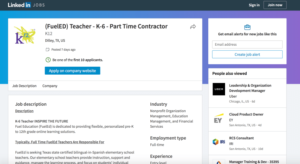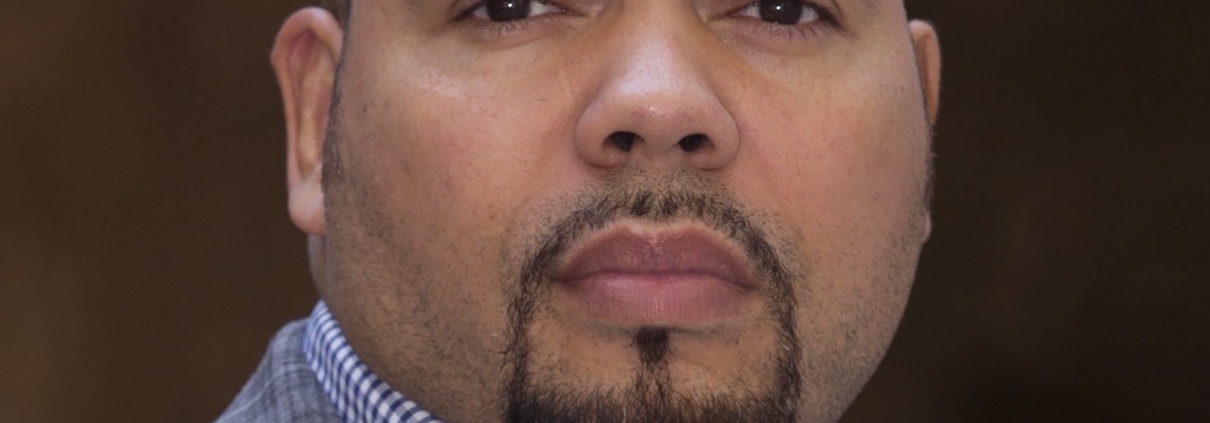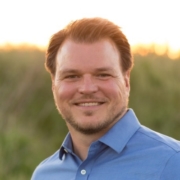Today we explore the schooling received by children affected by the Trump administration’s immigration policy of family separation.
My guest is Julian Vasquez Heilig, a professor of educational leadership and policy studies at California State University Sacramento. Julian writes a blog entitled “Cloaking Inequity”. In a recent post, he reported on a Texas-based detention center forcing children to use an online, for-profit charter school.
Citation: Heilig, Julian Vasquez, interview with Will Brehm, FreshEd, 125, podcast audio, September 10, 2018. https://www.freshedpodcast.com/heilig/
Transcript, translation, and resources:
Will Brehm 1:35
Julian Vasquez Heilig, welcome to FreshEd.
Julian Vasquez Heilig 1:37
Glad to join you.
Will Brehm 1:38
So when the Trump administration decided to separate families crossing the border, it needed to provide educational services to the children while in these detention centers. What kind of education was actually made available to these detained children?
Julian Vasquez Heilig 1:58
Well that’s a good question. From best we can tell, there’s there’s been quite a different set of approaches across the different detention centers. One of the real challenges that policymakers, Congress, people, other advocates have discovered is that it’s actually quite difficult. Even the media. It’s actually quite difficult to get access to these detention centers. That’s for a variety of reasons, but one of those probably primary reasons that folks are citing is that many of these detention centers are privately operated. And because they’re privately operated, they have the prerogative to not allow folks into these camps, into these areas. So one of the first conversations was about Southwest Key; they’re a nonprofit, so to say, that is near Austin, Texas and it also operates in other parts of Texas. And the way that Southwest Key went about it is, not only did they operate a detention center, but they also operated a charter school – brick and mortar, so to say, charter school. Then more recently, this last week or so, we started to find out about another approach in Dilley, Texas. The South Texas Family Residential Center is actually the largest immigrant detention center in the United States. It has a capacity to hold 2,400 refugees and immigrants, primarily women and children from Central America, but other countries too. And the conversations, the sources in Texas are saying that they’re using an online charter there. So as you look across these different detention centers, there’s different approaches. But recently, the Texas Education Agency, talking specifically about Texas, where many of these detention centers or these detention camps are located. The Texas Education Agency recently said that the state of Texas and the school districts there have no responsibility to educate the children that are being held in these centers. And so that really puts the onus on the federal government and the decisions that they’re making to educate these kids.
Will Brehm 4:41
So between these two different detention camps, in Austin, Texas, and in Dilley, Texas, how many children are we talking about?
Julian Vasquez Heilig 4:50
That’s a really good question. I’ve seen news reports, of course; it’s hard to really know. I mean, I don’t even think the Trump administration has a good hold on these numbers. If you’ve been following the news, the ACLU and other folks that have been litigating this, they found it difficult to get exact numbers. But they believe now that the number of children being detained is in the hundreds instead of the thousands. But that’s just the best information that the administration has provided to the media and other advocates.
Will Brehm 5:26
So I guess since it’s such a sort of fluid situation that’s happening and it’s so diverse in terms of educational providers based on these different detention camps, why don’t we zero in on one of them which you have recently written about in Dilley, Texas. Who is the service provider for the education services that the children are receiving in Dilley, Texas?
Julian Vasquez Heilig 5:54
So one of the interesting things that I don’t think a lot of folks realize about this immigration debate is that it’s actually a profit center. It’s a moneymaker for corporations. So for example, the Dilley, Texas, South Texas Family Residential Center, is run by an organization called Core Civic, which was previously called Corrections Corporation of America, which, infamously, has been criticized by the ACLU and is a for-profit prison company. I think that’s one of the things that many folks just don’t know about this immigration conversation, is that there are actually large corporations that are profiting from the detention of these children. There are corporations profiting from the detention of families with their children.
Will Brehm 6:47
How is the money being earned? Where’s the profit coming from?
Julian Vasquez Heilig 6:51
Well, these different corporations have contracts, and my understanding is that the average stay at one of these detention centers is about a year. And so what happens is the federal government pays a fee to the detention centers to hold the families and with children, or to hold the children separately from their families, to these large corporations. But that’s only half of the story. So half of the story is that the Corrections Corporation of America is making money from their detention, but now, you also see a for-profit online, charter school company coming into the conversation – K12 Inc., and their subsidiary that they spun off a couple of years ago, called Fuel Education – has the contract from the federal government to provide a online charter school education to the children being detained at Dilley. So not only do you have corporations profiting from the detention of these families in terms of the camps, but also you have companies profiting from the education of the detention of these children and families.
Will Brehm 8:18
And so what do we actually know about Fuel Education?
Julian Vasquez Heilig 8:22
That’s a really good question, and it’s a difficult question. The way I was able to confirm that this was happening is you can actually go to LinkedIn right now. And I posted a picture, a screen capture, of this that shows that Fuel Education is hiring bilingual teachers in Dilley, Texas. Because the traditional media hasn’t yet covered this. Now, since I posted my blog posts, I’ve received calls from members of the media and they’re now investigating what type of education Fuel Education is providing there. A piece in the Wall Street Journal said that children at Dilley, Texas “go to school most days”, and I thought to myself, “So they don’t go to school every day?” So what that means exactly, the media is trying to get access to understand. Because there’s a couple of options here: one, the kind of education that these children could be receiving “most days” could be a purely online education from K12 Inc., or they could be receiving a blended approach – an approach where they have some online, and then they have some classroom experience. Or perhaps, which I think would be unusual, a traditional classroom setting, which would be like what you would typically see in your local neighborhood school. But considering that K12 Inc. and Fuel Education is involved, it’s believed, and folks are still investigating this, to understand how much online, how much blended, or what exactly is happening there for those kids.
Will Brehm 10:06
And do we know anything about the curriculum? Like, are they following the Texas state curriculum? What are they actually even teaching?
Julian Vasquez Heilig 10:14
That’s a good question. So you know, K12 Inc., I think first, it’s important to say that the K12 Inc. is infamous. It’s infamous in California because their subsidiary, which is called CAVA here in California, has more dropouts than it has graduates from its high schools. In Pennsylvania, they also performed incredibly poorly and you can see research, for example, by Gary Miron, there’s been research released by the National Education Policy Center. And the predominance of the research literature, if you allow me to be the professor here just for a second, the predominance of the research and policy briefs that are out there, say the K 12 Inc. has substandard outcomes for children. You could just go to your Google Scholar or Google and type in “K12 Inc.” and “financial problems”, or type in “K12 Inc.” and “research” – you know, do some citizen research – and it’s pretty clear that what K12 Inc. does has basically been unsuccessful just about everywhere they’ve operated. So what you have here is the federal government hiring a contractor that has a really poor reputation in the research base in policy briefs and other peer reviewed research in providing this substandard education to these immigrant kids. So that’s what we know about K12 Inc.; they’ve basically performed poorly everywhere they’ve gone.
Will Brehm 12:01
This might be a question you might not be able to answer, but why would the government contract a service provider that is known for having substandard outcomes?
Julian Vasquez Heilig 12:11
Well that’s a great question. One of the interesting things about this is that the US Secretary of Education was an investor in K12 Inc. before she became Secretary of Education. We know that Betsy DeVos is on the record saying that online charter schools are a “great idea”. I’m not quoting her exactly, of course, but she’s been very supportive. We know that, in general, Donald Trump and Betsy DeVos are big supporters of charter schools, including online charter schools. And it makes sense with this administration. During the campaign, Donald Trump promised to spend $20 billion on school choice. Now, there was a recent article in the press yesterday talking about how Betsy DeVos had basically failed to implement a school choice agenda at that scale, at the $20 billion scale. But even though she wasn’t successful and the Trump administration hasn’t been successful on implementing online charters and charter schools writ large, where they have been successful is allowing charter schools into these detention centers where immigrant students and their families are being held. So while for the general public, we haven’t seen an explosion of Betsy DeVos’s ideology and support of online charter schools, apparently in these detention centers that has been the case.
Will Brehm 13:46
Do you think if the states where these detention centers operate stepped in to say, “We will take care of the education for these immigrant children, these detained children”, would we not see the choice movement operating so successfully?
Julian Vasquez Heilig 14:04
Let me speak to two issues here: The first is that, essentially, the Texas Education Agency in Texas has said that state funds can’t be used to educate the children in these detention centers. And they’ve very specifically instructed school districts not to do so. Now, the school districts where these detention centers are located, have reached out to these detention centers from what my sources have told me and said that they’re willing to educate these kids. But oftentimes when we talk about the school choice movement, we talk about parents having a choice. Well, this is an example of the federal government saying, “You don’t have a choice. We are going to force you to attend a online charter school that has a record of substandard outcomes.” So it’s kind of ironic, this school choice movement saying, “All parents should have a choice.” But in the case of Dilley, and in the case of these other detention centers, the parents have no choice. The only choice is this substandard offer, the substandard online charter school company. So I think that’s problematic.
Will Brehm 15:20
It’s interesting in some of these detention centers, from my understanding, the children were actually separated from families. So sometimes parents could not even make a choice because they weren’t with their children.
Julian Vasquez Heilig 15:32
Yes, that’s adding insult to human rights injury. Right? This is probably one of the most embarrassing and despicable things that our government has done in some time. I think it’s unfortunate because it’s quite consistent with say, what happened to Native Americans with the Carlisle school back in the 1800s. The US government took children from Native Americans and sent them to Indian boarding schools in Pennsylvania and other places. And the US wasn’t by itself and in these activities – taking children from their families and educating them in other settings. Canada, and other countries were also responsible for these type of heinous acts. And detention centers and detention camps are also not new to the United States. Sulu from Star Trek, he was detained in the Japanese internment camps during World War II. So, the US government has a history of taking children from communities of color. The US government unfortunately has a history of internment camps and entertaining people against their will. In the case of of the Japanese internment camps, they were full-fledged American citizens. So it’s really quite unfortunate that we have that history. I also think it’s quite unfortunate that many people don’t learn that history in their grade school years, or they don’t learn that history often even in their high school years. So I think that’s also one of our challenges, is that we have to stare down these injustices so that history doesn’t repeat itself. It’s quite unfortunate that our government separated these children, and I think that it’s a real tribute to those folks that protested across the United States. It’s a real tribute to Democrats and Republicans that put pressure on this administration to stop this human rights violation. I think it’s a real tribute to the courts. It’s a real tribute to the advocacy organizations – ACLU and other organizations – that sought to stop this practice of child separation, family separation. But even after all of that, there are still hundreds of children that have been separated from their parents and that are in these detention camps across the United States. So there’s still work to do here.
Will Brehm 18:23
I actually want to ask a comparative question. Because, as you said, America has a rather long history of putting children in detention camps. Compared to previous times when there were detention camps, is a big difference that the education today in these detention camps is being provided by for-profit companies? Like back when there were the Japanese internment camps, was education being provided by for-profit companies?
Julian Vasquez Heilig 18:55
Well, of course not. I’m going to be honest with you, the whole idea of profiting from education, and charter schools, and school vouchers, those ideas really came to prominence right around Brown vs. Board in the 1950s when school segregation was outlawed. Because as you know, for a long time, especially in the South, you had de jure segregation – segregation required by Jim Crow laws. in the North, you had, essentially, de facto segregations; the schools were segregated because of forced residential patterns and redlining. This neoliberal, for-profit approach to education really didn’t arise until about the middle of the last century. And it’s gaining steam in the US, gaining steam in other countries. There’s other forms of this for-profit corporations. For example, Chile has had school vouchers for quite some time, although more recently they’ve started to pull back from for-profit schools. So this is something that has been gaining momentum, of course, after World War II. It’s a more recent phenomenon – last couple of decades.
Will Brehm 20:23
And so what do you think can be done? There’s so many layers here that need to be worked out. On the one hand there are these hundreds of children that are still detained that seem to take a big priority of the energy that needs to go into changing this system, but at the same time, there’s this larger issue of profit-seeking businesses in education systems. So what do we do?
Julian Vasquez Heilig 20:56
First, I think it’s important to educate the public on the performance of a lot of these profit-seeking organizations. I think we have done that a little bit in this conversation talking about the research that we have on K12 Inc. and their poor performance in California, in Pennsylvania, and many other places. So I think that’s part of the conversation. I think another part of the conversation is activating communities once they understand what’s at stake. So, the organizing piece. I’m also the education chair for the California NAACP, and part of my role in the civil rights organization as education chair is to educate African Americans and others about what’s happening with the privatization and private control of education, that there are people seeking to profit off the backs of our children. And I see that as a problem. And I think the third piece, I think the reason why the media has taken so much heat recently – from certain quarters, not all quarters – is because sunshine is the best disinfectant. And I think that the media has done really a fantastic job in really elucidating what’s going on in this specific arena in terms of the family detentions. I think it’s also important … So you have the traditional news coverage. Nowadays, we also have social and new media, so whether it be this podcast, whether it be posts on LinkedIn, Twitter, so we can each have a personal stake in having conversations about family detentions, and the education of these children, and the illegitimate approaches to dealing with immigration issues in our nation. So I think there’s several ways that we can address and bring light to what’s happening with these children and the education of these children in detention camps.
Will Brehm 23:20
What about researchers? One of the issues that seems to me is that education being provided by a private company that has no legal obligation to make information public, what do researchers do in such an environment?
Julian Vasquez Heilig 23:36
That’s a really difficult question. Because, as you are probably very aware, the cycle for research is a longer-term endeavor. The media has a much shorter research cycle for stories like this, but for a researcher to … and actually I had, when I published that blog post, one of my former students, who’s now a professor at the University of Buffalo, reached out to me and said, “Julian, what can we do about this?” And first my first inclination was, “Well, maybe we can try to get access to these camps.” And she said, “We really have to be realistic; we probably won’t get access to do, conduct research.” So how can we gather the literature together to inform the research community about the implications of family detention on the success of students – their long-term success? Those are conversations that we’re having, and I think part of the challenge of traditional academia is that there’s some limitations and we have a longer cycle for research. But in the short term, I think academics have the potential to mobilize knowledge through some of the means we talked about – through social media and some of these other … you know the blog post about this had about 10,000 views in a couple of days. And so NBC and lots of other folks, including yourself, called to talk about this. And so one choice was, I could say, “All right, let me put together a literature review on the impact of family detention and the education of these children.” And then about eight months later, publish an article. We can still do that, so it’s not really an “or” proposition, it’s an “and” proposition; I think we should do both. I think in the short term, that we should bring conversations about research, and the background of these organizations and the intent of these organizations, and what’s problematic about family detentions, bring that to bear and in social and new media spaces. But then I also think it’s incumbent upon academia to conduct the traditional research approaches which have much longer time frames.
Will Brehm 26:02
It’s interesting, I have done a lot of work on private tutoring. And private tutoring, it usually, or it has historically, been seen as connected to, but separate from, mainstream schooling. And one of the big challenges that researchers of private tutoring have had is getting access, because as you might know, lots of big for-profit companies manage private tutoring companies. They have no reason to make their information public: how their students are doing, what they’re teaching, why they’re teaching what they are. But researchers have found ways of getting in. It does take a long time and it’s much more qualitative, ethnographic work that that can come out of it, that can illuminate what’s going on inside of these private companies. But with these for-profit charter schools denying access to researchers, and even just probably government regulation and government oversight, which would ultimately lead, I would imagine, to some sort of public documentation. It seems as if the mainstream education world that we live in, that we sort of assume is slowly moving over into that realm of private tutoring that I know so well, and it becomes this sort of hybrid system that is becoming very opaque. And it just becomes more and more challenging, as you said, to illuminate – add the sunshine, or create the sunshine – that’s needed for people to actually make choice. To go back to that original idea, it’s just so convoluted.
Julian Vasquez Heilig 27:43
Sure, and this is an important role that the media, that academics, play in this space. In terms of sunshine as the best disinfectant, there’s clearly a rule. I’ll give you an example: One of my doctoral students when I was on faculty at UT Austin, before I came to California, was studying special education and charter schools, and for those folks that are aware of some of the debates around charter schools is that they, on average, serve less special education students than neighborhood public schools. And so her dissertation was investigating this. And so she contacted every charter in the state of Texas via mail. And she received back 15 responses saying that folks were interested, and then in the final analysis, only about ten charter schools said yes to being studied, which is a real problem for the advancement of knowledge and accountability for taxpayer money and the fact that charter schools just didn’t want to be studied. And because they’re privately operated, they can’t be forced to allow researchers to understand what’s happening there and make that information and that knowledge available to the public. So that’s one of the challenges as we make prisons private, as we make schools private, as we allow online for-profit charter schools to educate our children. There’s less accountability to the public for what actually happens inside those walls.
Will Brehm 29:19
So the government could obviously require these for-profit providers to provide public information. So should we be lobbying the government to create these sort of regulations for, for instance, online for-profit charters?
Julian Vasquez Heilig 29:34
Sure, I mean, that that could happen. But in places like California, we’re always debating transparency and accountability laws for for-profit and charter schools. I mean, not all charter schools are for profit. In Michigan, more than 80% of charter schools are for profit there. In California, we have very very few for-profit charter schools. In fact, there’s a bill in the legislature right now – it’s on the governor’s desk – for him to ban for-profit charter schools. And he’s actually debating whether he should ban for-profit charter schools or not. With himself, apparently. So I think that that issue is something that we’re going to have to wrestle with, and for schools that are Catholic or just purely private, they don’t have to report anything to the federal government. So if they’re receiving, for example, a school voucher, which is a pot of money to attend a private school, there’s no regulation when it comes to private schools. So with for-profit schools, at least there’s a minimal amount, there could be a minimal amount of transparency and accountability. But when we’re talking about pure private schools, they could be nonprofit, sectarian schools. There’s absolutely no accountability for that taxpayer money.
Will Brehm 30:52
Well, Julian Vasquez Heilig, thank you so much for joining FreshEd. It sounds like this is a topic that is going to need much more research and media attention going forward.
Julian Vasquez Heilig 31:03
I definitely agree. I enjoyed joining you today.
Trump, detained children, and online charter schools










